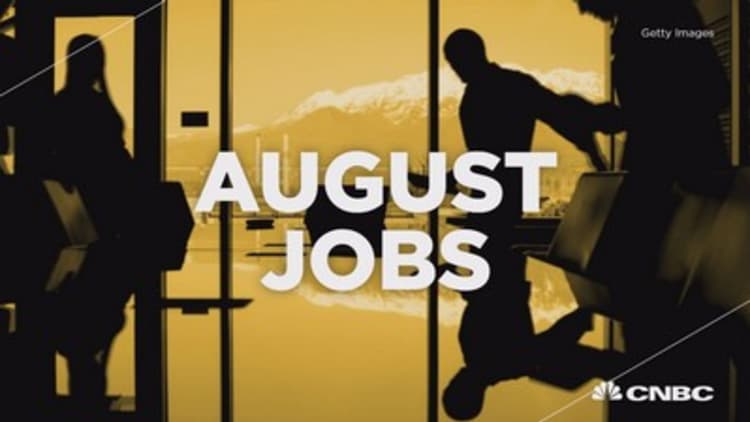
The U.S. economy added 173,000 jobs in August, lower than expected, in a report that gave fuel to both sides of the rate-hike debate, the Bureau of Labor Statistics reported Friday.
In addition to the new jobs, the unemployment rate fell to 5.1 percent. A separate measure that includes those who have stopped looking for work or are working part time for economic reasons edged lower to 10.3 percent. The labor force participation rate remained mired near its lowest level since the late 1970s at 62.6 percent.
The U.S. was expected to create 220,000 jobs in August, with the unemployment rate falling to 5.2 percent. Equity indexes initially dropped after release of the jobs report, while bond yields moved higher.
"It's the same old, same old," said Scott Clemons, chief investment strategist at Brown Brothers Harriman. "This just continues the trend that we've seen where all sectors of employment continue to improve modestly."
The payrolls number is the final critical data point before the Federal Reserve meeting Sept. 16-17. Market participants are divided over whether the Federal Open Market Committee will vote to raise interest rates for the first time in more than nine years.
Complicating the decision is an August number that traditionally has been the quirkiest of the year. Over the previous 27 years, August's numbers have missed Wall Street economists' expectations 21 times, with the average error 61,000, according to Deutsche Bank.
Read More
Moreover, Deutsche found that misses to the downside generally are much larger than those to the upside.
Just 27 percent of futures traders at the CME expect a September rate hike, with the largest likelihood in December, at 58 percent. Wall Street experts immediately went to work trying to interpret the jobs number in terms of Fed policy.
Markets have been volatile in the late summer, with investors worrying that a slowdown in China will spread to the global economy. Major indexes lost more than 6 percent in August, and the is down more than 1 percent in September.
"I sort of wish the Fed would go ahead and raise the funds rate by 25 basis points in September," Clemons said. "I think that would pour some oil on the volatility. That would be a way for the fed to signal, 'yes, we're watching what's going on in China; yes, we're aware of global disruptions, but we've got an economy that's in the seventh year of expansion, we've got an unemployment rate down to 5.1 percent, this is an economy that deserves to have interest rates."
Read MoreFed's Lacker: 'It's time.'
In the jobs market, health care and social assistance led the way with 56,000 new workers. Financial activities added 19,000, while professional and business services contributed 33,000.
Manufacturing saw a decline of 17,000 for the month, while mining fell 9,000.
Hourly earnings showed a mild uptick, climbing 8 cents an hour, representing a 2.2 percent gain over the past 12 months. The average work week edged higher to 34.6 hours.
Read MoreGreenspan: The Fed can't solve every problem
The creation of new jobs titled toward full-time, which added 435,000, while part-time positions grew by 148,000.
Previous months' numbers were revised higher as well, with June moving from 231,000 to 245,000 and July going from 215,000 to 245,000. Average job creation over the past 12 months was at 247,000.


